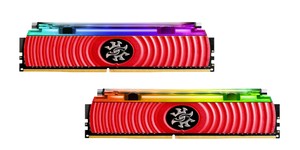
Samsung has announced that it has begun mass production of 8Gb DDR4 memory chips and 32GB modules, based on its latest 20nm process and aimed - initially, at least - at enterprise customers.
Supported by Intel's latest processors, DDR4 promises improved bandwidth and lower power usage over DDR3 memory. Using its latest 20nm process node, Samsung's semiconductor arm has begun producing 8Gb chips that are making their way into 32GB DDR4 memory modules - allowing an four-slot server motherboard up to 128GB of system memory.
'Our new 20nm 8Gb DDR4 DRAM more than meets the high performance, high density and energy efficiency needs that are driving the proliferation of next-generation enterprise servers,' claimed Samsung's Jeeho Baek of the launch. 'By expanding the production of our 20nm DRAM line-ups, we will provide premium, high-density DRAM products, while handling increasing demand from customers in the global premium enterprise market.'
The first use for the 8Gb chips is in 32GB registered dual in-line memory module (DIMM), boasting a 2,400Mb/s data rate per pin compared to 1,866Mb/s of an equivalent DDR3 module. The new modules also run at 1.2V for lower heat and power usage, include improved error detection and correction features, and form part of Samsung's planned roadmap to 128GB memory modules - achievable, the company claims, by stacking its existing 20nm design in a three-dimensional layout using through-silicon via (TSV) technology.
While consumer-centric systems supporting DDR4 memory are now available, Samsung has not yet indicated when it plans to bring its high-density 20nm DDR4 chips to that market. As a result, enthusiasts wanting to get hold of the company's latest creations will need server-class motherboards with support for registered DIMMs if they want to pick the as-yet unpriced modules up when they hit the market in the coming weeks.
Supported by Intel's latest processors, DDR4 promises improved bandwidth and lower power usage over DDR3 memory. Using its latest 20nm process node, Samsung's semiconductor arm has begun producing 8Gb chips that are making their way into 32GB DDR4 memory modules - allowing an four-slot server motherboard up to 128GB of system memory.
'Our new 20nm 8Gb DDR4 DRAM more than meets the high performance, high density and energy efficiency needs that are driving the proliferation of next-generation enterprise servers,' claimed Samsung's Jeeho Baek of the launch. 'By expanding the production of our 20nm DRAM line-ups, we will provide premium, high-density DRAM products, while handling increasing demand from customers in the global premium enterprise market.'
The first use for the 8Gb chips is in 32GB registered dual in-line memory module (DIMM), boasting a 2,400Mb/s data rate per pin compared to 1,866Mb/s of an equivalent DDR3 module. The new modules also run at 1.2V for lower heat and power usage, include improved error detection and correction features, and form part of Samsung's planned roadmap to 128GB memory modules - achievable, the company claims, by stacking its existing 20nm design in a three-dimensional layout using through-silicon via (TSV) technology.
While consumer-centric systems supporting DDR4 memory are now available, Samsung has not yet indicated when it plans to bring its high-density 20nm DDR4 chips to that market. As a result, enthusiasts wanting to get hold of the company's latest creations will need server-class motherboards with support for registered DIMMs if they want to pick the as-yet unpriced modules up when they hit the market in the coming weeks.

MSI MPG Velox 100R Chassis Review
October 14 2021 | 15:04








Want to comment? Please log in.